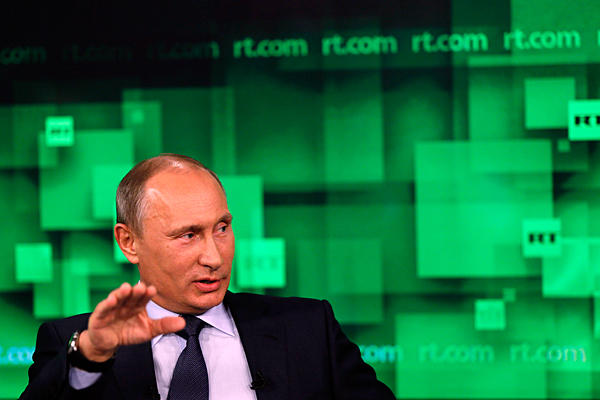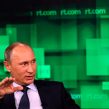
Putin Hints at Normalization with Georgia on Russian Terms
Publication: Eurasia Daily Monitor Volume: 10 Issue: 115
By:

Russia’s barbed-wire fence construction in Georgia beyond the occupation line (see EDM, June 3, 11–13, 17) has provided another demonstration of the shifting balance of power (“new geopolitical realities”) in this region. It drove home this point without resorting to outright military aggression; and it may have indicated that further such demonstrations, carefully calibrated in their scope but eloquent in their message, carry negligible risks of a concerted Western response to Russia.
Against this backdrop, Russian President Vladimir Putin made an overture to Georgia in a June 11 televised interview (Russia Today TV, June 11, cited by Interfax and Civil Georgia, June 12; Russian Presidential website, posted June 13). Moscow-based journalist Sophie Shevardnadze, a granddaughter of the former president of Georgia, was picked to conduct this conversation with Putin.
First, Putin acknowledged the existence of two “red lines” that neither side could cross: the Russia-recognized “independence” of Abkhazia and South Ossetia versus the territorial integrity of Georgia. He “could not imagine” Russia de-recognizing Abkhazia and South Ossetia, but he also admitted that Georgia “struggles for, as it calls it, Georgia’s territorial integrity.” The proper approach, according to Putin, “requires careful consideration, a competent solution, willingness to solve this issue based on the interests of all those who live in these territories.”
Thus, Putin seems to strike a pose of equidistance, or at least to awaken such hopes in Tbilisi: ostensibly, he rules nothing out; nothing is non-negotiable. Putin insinuates that the ultimate status of Abkhazia and South Ossetia is not necessarily a closed question but might hypothetically be re-opened in the future. He seemingly professes to be agnostic about the optimal or ultimate solution.
Second, Putin proposes a “full-scale restoration of Russia-Georgia relations,” proceeding gradually and starting with cooperation between law-enforcement and security services. “Such work will be the first step toward restoration of the visa-free regime.” Putin urges such cooperation on two fronts: providing security for the upcoming Winter Olympic Games in Russia’s Sochi (adjacent to Georgia’s occupied territory) and combating terrorists generally: “You probably know that terrorist elements are, were [sic] infiltrating into our [territory] from Georgian territory.”
With this, Putin capitalizes on the new Georgian government’s public accusations that the previous government had cooperated with terrorists against Russia. The Kremlin itself had discontinued that propaganda line for years, until the new Georgian government handed it back to Putin (see EDM, May 3, 7). That Moscow would seek to control Georgia’s security services as a prerequisite to any “normalization” was a predictable demand all along. Presidents Eduard Shevardnadze and Mikheil Saakashvili each faced that demand after taking office (Shevardnadze accepted under duress and could never fully extricate from that situation; Saakashvili rejected this outright). For Putin (as for his predecessors in this activity), such cooperation undoubtedly means Russian control of the Georgian security services.
Putin’s interview also attempted to position Russia indirectly as an actor in Georgian politics. Professing his and Russia’s “very warm attitude toward Georgians, closeness to the Georgian people,” Putin complimented Patriarch-Catholicos Ilia II of the ultra-traditionalist Georgian Orthodox Church as “a real Georgian” (implying that Georgia’s Westernizers are not real Georgians). Putin praised Ilia II for defending “the interests of the Georgian people” during their meeting in Moscow but did not mention Georgian government leaders in the monitored text of his live interview. No Russian-Georgian meetings have taken place at the governmental level following Georgia’s October 2012 regime change.
Tactfully omitting to mention Georgia’s aspirations to join the North Atlantic Treaty Organization (NATO—a major obstacle to Georgia-Russia “normalization” on Russian terms), Putin chose instead to reference past Georgian military contributions to Imperial Russia.
For all its vagueness and ambiguities, Putin’s interview amounts to an unprecedented overture to Tbilisi. By hinting that nothing is non-negotiable, Moscow seeks to nudge Tbilisi into choosing between its two sets of objectives: those associated with the Western orientation, NATO and the European Union, on one hand; and, on the other hand, improving relations with Russia and re-creating Georgia’s territorial integrity in some new form, through negotiations requiring Russia’s cooperation.
Georgia’s incumbent government seems to take the position, thus far, that those two sets of objectives are mutually compatible and can be pursued on parallel tracks. If Western support is seen to be faltering, however—a perception that the barbed-wire fence affair could only corroborate—then the Georgian government would have to make decisions about prioritizing one set of objectives over the other set or about the relative speeds of its two policy tracks. Putin’s overture seeks to entice Tbilisi into exploring a hypothetical basis for trade-offs down the road.




